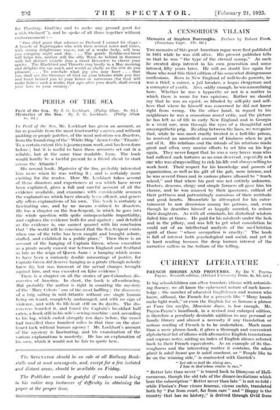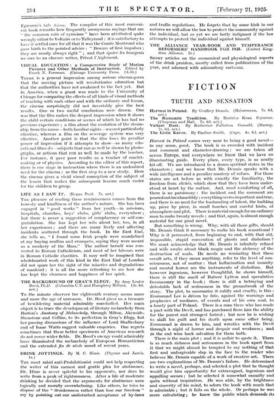CURRENT LITERATURE
Tr big schoolchildren can often translate idioms with astonish- ing fluency, we all know the ephemeral nature of such know- ledge : the number of educated Englishmen and women who know, offhand, the French for a proverb like " Many hands make light work," or even the English for so famous a phrase as Vous Iles orvefre, Monsieur Jossc, is low enough. Mr. Payen-Paync's handbook, in a revised and enlarged edition, is therefore a peculiarly desirable addition to any personal or family library and almost a necessity if any translation or serious reading of French is to be undertaken. Much more than a mere phrase-book, it gives a thorough and convenient alphabetical list of idioms with alternative English translations and copious notes, adding an index of English idioms referred back to their French equivalents. As an example of its tho- roughness and the interesting matter it contains, On adore plutOt Is soleil levant que is soleil couchant, or" People like to be on the winning side," is contrasted with Garrick's
" Let others hail the rising sun, • .1 bow to that whose course is run." _
" Better late than never " is traced back to Dionysus of Hall- carnassus, though the old tale of the dinner-invitations which bore the subscription " Better never than late " is not re-told : while Florian's Pour vivons heureux,' vivons caches, translated both by " Far from court, far from care " and " Happy is the country that has no history," is derived through Ovid from Epicurus's XdOe PLthacts. The compiler of this most conveni- ent book remarks how frequently anonymous sayings that are the common coin of cynicism " have been attributed quite wrongly either to Voltaire or to Talleyrand : it is satisfactory to have it settled once for all that it was the Comte Montrond who gave birth to the pointed advice : " Beware of first impulses ; they are nearly always right " ; and that epater les bourgeois we owe to an obscure writer, Privat l'Aiglemont.











































 Previous page
Previous page